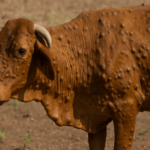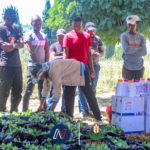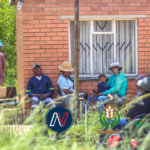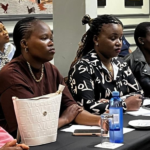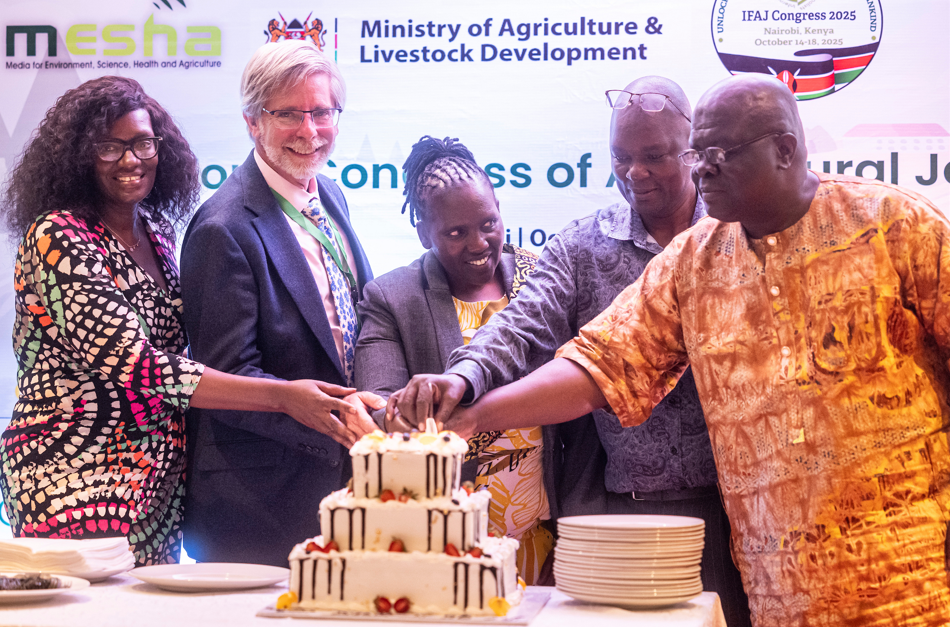Nairobi, Kenya – “Agriculture is the lifeblood of Africa, sustaining communities, driving economies and shaping the future of millions, yet, its stories often remain untold, hidden behind statistics and policy debates.”
The 2025 IFAJ (International Federation of Agricultural Journalists) World Congress of Agricultural Journalists, hosted by Kenya’s Media for Environment, Science, Health and Agriculture (MESHA) at Nairobi’s Ole Sereni Hotel from October 15 to 18, sought to change that narrative.
With over 250 delegates from 45 countries, the congress highlighted the vital role journalists play in telling Africa’s agricultural story to the world.
Opening the congress, MESHA Chairperson Bozo Jeje reflected on the association’s 20-year journey and the centrality of agriculture in African life; “Agriculture is more than an economic sector in Kenya. It is our heartbeat. It puts food on our tables, keeps families working and drives our economies forward.
“As journalists and communicators, we are translators of science and voices for farmers. When we tell stories of innovation, we turn data into hope. When we expose injustice, we plant seeds of accountability and if we do not tell Africa’s agricultural story, someone else will, and they will not tell it right.”
Bozo emphasised the responsibility journalists carry in shaping public understanding and policy, urging them to highlight the contributions of youth, women and smallholder farmers.
“Let us commit to telling stories of courage, creativity and change. Our reporting must centre on those whose work makes agriculture possible, and ensure that our audiences understand the opportunities, the challenges and the innovation happening across Africa.”
MESHA Secretary Aghan Daniel highlighted how agricultural journalism has evolved over the past two decades, stressing its role in driving solutions.
“This congress brings agricultural journalists from across the globe together to witness how African journalists are transforming agriculture through storytelling.
“Twenty years ago, stories on agriculture were rare in print, on radio or on TV. Today, journalists are producing solution-oriented stories that inspire action, inform farmers and influence policy,” he said, adding, “Our role is not just to report; it is to connect research, innovation and the realities of the farm to communities that depend on them.”
Speaking at the opening, the IFAJ President, Steve Werblow, reinforced the global importance of agricultural journalism stressing that agriculture knows no borders.
“Climate change, crop diseases and food security are international challenges and journalists must provide accurate, timely and accessible information so that farmers and policymakers can make informed decisions. At IFAJ, our mission is to share knowledge, defend press freedom and ensure that the voices of farmers are heard worldwide.
“While in Kenya, I encourage you to learn as much as you can, and bring that understanding home to your communities and your audiences.”
Werblow also underscored the collaborative nature of agricultural journalism.
“What we in this room, and our IFAJ colleagues around the world bring to our audiences is understanding and perspective on how research in places like Kenya can help farmers in our own countries. Insight into the people and processes behind the crops, the livestock and the innovations that feed the world.
“Agricultural journalism is not just reporting, it is a vital service to societies globally,” Werblow said.
Over four days, delegates attended plenaries, workshops and field visits, exploring Kenya’s farms, research stations, aquaculture projects and digital agriculture innovations.
Sessions addressed climate-smart farming, youth-led initiatives, gender equity and ethical reporting.
The IFAJ–Alltech Young Leaders Programme spotlighted emerging journalists pushing the boundaries of agricultural storytelling, demonstrating how media can bridge the gap between science and the farmer’s field.
The congress concluded with a celebration of African journalists’ dedication. Delegates departed inspired to bring back stories that connect research, innovation, and farmer experiences to communities worldwide.

